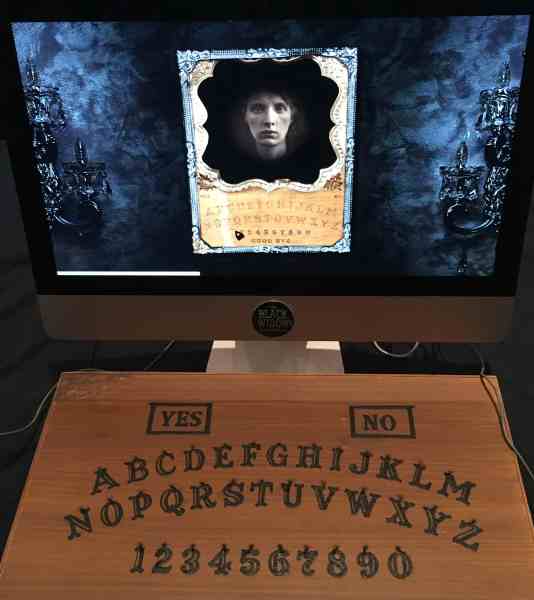The Black Widow is a game that lets you talk to the dead. All the dialogue is word-for-word from the trials of a woman named Louisa Collins, a convicted murderer from the 1880s. Developer Flux gives the player a virtual Ouija board and a chance to ask an animated portrait of Collins questions about what exactly transpired — and whether or not she’s innocent of her crime. The game is slated for release in 2018 for PC, Mac, iOS, and Android devices.
When I played a demo at the IndieCade Festival, Flux ran with the theme and built a Ouija board controller for The Black Widow. It fit over the keyboard, and instead of using a planchette to select letters, I simply pressed them to spell out my questions. A virtual Ouija board was also on the screen for players to tap or click. Above it, a sepia-tinted Collins (portrayed by actress Amber Cunliffe) gazed solemnly at me, waiting to hear what I had to say. I could ask her a few key words that garnered a response. Each time I stumbled across a pertinent detail to her story, a light would blink on at the bottom of the screen.
I had an eerie feeling about hearing the actual words of someone long gone. Another chilling facet is that Collins’ case was contentious — it went to four different trials and left many doubts in people’s minds as to whether or not she poisoned her two husbands, according to the Sydney Morning Herald.
When it comes to the player’s role in the game and why we’re interrogating Collins, Richard Fox, the creator and designer of The Black Widow, says that that’s somewhat ambiguous.
June 5th: The AI Audit in NYC
Join us next week in NYC to engage with top executive leaders, delving into strategies for auditing AI models to ensure fairness, optimal performance, and ethical compliance across diverse organizations. Secure your attendance for this exclusive invite-only event.
“There’s someone within the game who’s identified this picture which seems to be haunted by this spirit that may have had some traumatic experience,” said Fox in an interview with GamesBeat. “And so it’s a bit mysterious, whether you’re talking to an actual spirit, or whether it’s the picture. It’s a 19th century photograph that comes alive, essentially. It’s something to do with that photograph. Is the spirit there now, or are you communicating through time? That’s kind of the mystery.”
Fox chose to incorporate the Ouija board because it’s appropriate to that period of time, and also because of how people originally believed it could be used to talk to the deceased. Also known as a spirit board or talking board, it was important to the spiritualism movement in the mid-19th to early-20th centuries, which believed that the dead wanted to communicate with the living. Though it started out as a somewhat mystical object, it gradually became known as a whimsical game, particularly after a businessman patented the iconic design, along with the name “Ouija board,” and commercialized it.
“People still see it as a game,” said Fox. “But here I’m actually going back the other way and sort of saying, well, yeah, there’s this fun—it’s meant to be communicating with a deceased spirit, but it doesn’t. I’m actually making that true, using the conversational interface and connecting with actual records.”

Above: The Black Widow with a Ouija board controller.
Collins was known to be something of a mysterious character, but Fox realized that there were tons of court records he could dig through as he tried to piece together something about her interior life. He says that Cunliffe, who also does Collins’ voice in the game, also did her own research. The result is a faithful interpretation of what Collins might have sounded like.
“[Cunliffe] looked at people in that period of the 19th century in Australia at the time, which isn’t the same accent that we have now,” said Fox. “She basically created a character within the voice, based upon her understanding of what she read in the letters and court records and background. Which is an interpretation, since we don’t have audio recordings of the original person. But it’s a character in itself.”
Players will have to pay close attention to what Collins says if they want to make progress. Fox says that part of the inspiration for The Black Widow was to experiment with conversation in interactive media. In this case, players have to practice active listening to pick up on key words.
“You’re forced to make those decisions, learn what the attitudes were, learn how to interpret people’s stories, make sense of whether they’re telling the truth or not, and ask them those questions,” said Fox. “You’re more engaged. That was one of the objectives, to look at a more active use of conversation beyond just selecting pre-written responses.”
The endgame is more about giving the player clues and letting them make up their own mind about what might have happened. And it’s more about figuring out the truth, or shades of truth, rather than actually effecting any change.
“At the start of the game, this character is essentially pleading her innocence and suggesting that she’s been unjustly executed,” said Fox. “There’s that question of, was she truly guilty, or was some injustice done? That’s your path within the game. Historically, you can’t actually control the events that happened. You’re not going to be able to resurrect her.”


